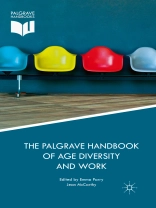This Handbook incorporates a variety of disciplines and approaches in order to provide a comprehensive and authoritative examination of the issues that result from increasing age diversity at work. Despite interest in this area exploding over the past few years amongst academics, practitioners and policy makers, the analysis of age diversity has remained primarily within disciplinary ‘silos’ such as Psychology or Sociology with a focus on ageing or generational differences, rather than a combination of approaches to understanding age diversity. Unique in its coverage of multiple perspectives, it considers not only generational and ageing perspectives to age diversity, but also highlights the importance of context in driving both the impact and response to this issue. The Palgrave Handbook of Age Diversity and Work includes contributions from leading scholars in age and generational diversity from across the world, discussing cutting-edge research findings about the nature andimpact of age diversity and presenting approaches to managing this phenomenon.
Tabela de Conteúdo
1 Introduction (Emma Parry and Jean Mc Carthy).- Section 1: Perspectives on Age, Age Diversity and Ageing .- 2 What is old at work?: Moving past chronological age (Jeanette N. Cleveland and Madison Hanscom).- 3 Toward and identity-based approach for examining age in the workplace: perspectives and implications (Michael J. Urick).- 4 An integrative psychological perspective on (successful) ageing at work (Josje Dikkers, Annet De Lange and Beatrice Van der Heijden).- 5 Age, generations and the labour market (Peter Urwin and Emma Parry).- 6 From age diversity to embedded ageing: exploring and addressing aged assumptions in organizational practices (Sophie Hales and Kathleen Riach).- 7 Promoting workability for our ageing population (Deirdre Fitz Gerald, Alex Reid and Desmond O’Neill).- Section 2: Older Workers .- 8 Healthy ageing and well-being at work (Kristina Potočnik).- 9 Innovative pathways to meaningful work: older adults as volunteers and self-employed entrepreneurs (Marcie Pitt-Catsouphes, Tay Mc Namara, Jacquelyn James, and Cal Halvorsen).- 10 Bridge employment: Transitions from career employment to retirement and beyond (Carlos-María Alcover).- 11 Understanding retirement processes: the role of life histories (Marleen Damman).- 12 Interventions in life and retirement planning (Anthony Chiva).- Section 3: Younger Workers .- 13 Millennials in Canada: young workers in a challenging labour market (Eddy S. Ng, Sean T. Lyons and Linda Schweitzer).- 14 Tripartite responses to young workers and precarious employment in the EU (Caroline Murphy and Melanie Simms).- 15 Young workers in Europe: perceptions and discourses on the labour market (Luis Enrique Alonso and Carlos J. Fernández Rodríguez).- Section 4: Ageist Attitudes .- 16 Ageist attitudes (Jean Mc Carthy and Noreen Heraty).- 17 Millenials, media and research: ageism and the younger worker (Joel T. Nadler, Rosey Morr and Samantha Naumann).- 18 Age discrimination at work (Donald M. Truxillo, Franco Fraccaroli, Lale M. Yaldiz and Sara Zaniboni).- Section 5: Age Diversity in Context .- 19 Employment of workers aged 65 and over: the importance of policy context (David Lain).- 20 The impact of national context on age diversity and age management: The case of the United Kingdom and Hong Kong (Matt Flynn, Heike Simone Schröder and Alfred C. M. Chan).- 21 Age-based generations at work: a culture specific approach (Emmanouil F. Papavasileiou).- 22 Young at heart, but what about my body? Age and aesthetic labour in the hospitality and retail industries (Dennis Nickson and Tom Baum).- 23 Gender, age and labour market experiences (Caroline Murphy and Christine Cross).- Section 6: Managing an Age-Diverse Workforce .- 24 Designing an HR system for managing an age-diverse workforce: challenges and opportunities (Edel Conway and Kathy Monks).- 25 Considering age diversity in recruitment and selection: an expanded work lifespan view of age management (Cort W. Rudolph, Eileen C. Toomey and Boris B. Baltes).- 26 Designing effective training for older workers (Kurt Kraiger).- 27 ‘When you grew up …’ or ‘how old are you?’ A review of theory and evidence on generational and age differences in psychological contracts (Xander D. Lub, Melanie De Ruiter & Rob Blomme).- 28 Career management over the life-span (Ulrike Fasbender and Jürgen Deller).- 29 Age diversity and leadership: enacting and developing leadership for all ages (Michelle M. Hammond, Gretchen Lester, Rachel Clapp-Smith and Michael Palanski).
Sobre o autor
Emma Parry is a Professor of Human Resource Management at Cranfield School of Management, UK. Emma leads several international research projects including “Cranet”, an international network of scholars examining the impact of national context on human resources policies and practices, and “5C” a global academic collaboration looking at the impact of national culture and age on careers. Emma is an Honorary Fellow for the Institute of Employment Studies and an Academic Fellow of the Chartered Institute of Personnel and Development (CIPD).
Jean Mc Carthy is a Lecturer in Human Resource Management & Organisational Behaviour at the Kemmy Business School, University of Limerick, Ireland. She is also a Global Research Associate with the Sloan Center on Aging & Work at Boston College and co-director of the Age in the Workplace Research Network (AWR-net), an international network of researchers seeking to address issues associated with age, generations and diversity at work, and has served as an advisor on ageing and ageism policy direction.












